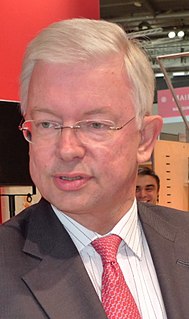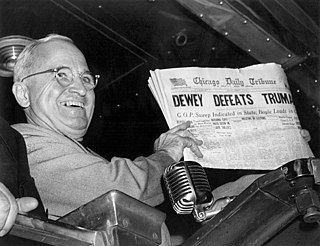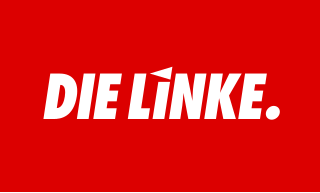
Germany is a democratic, federal parliamentary republic, where federal legislative power is vested in the Bundestag and the Bundesrat.

The Christian Democratic Union of Germany is a Christian-democratic, liberal-conservative political party in Germany. It is the major catch-all party of the centre-right in German politics. The CDU forms the CDU/CSU grouping, also known as the Union, in the Bundestag with its Bavarian counterpart the Christian Social Union in Bavaria (CSU). The party is widely considered an effective successor of the Centre Party, although it has a broader base.
The 2003 Lower Saxony state election was held in Lower Saxony in north-western Germany on 2 February 2003. The incumbent Social Democratic Party was defeated by the opposition Christian Democratic Union.
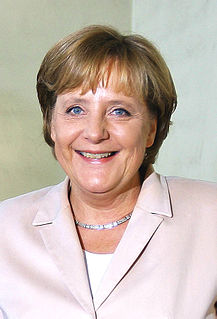
Federal elections were held in Germany on 18 September 2005 to elect the members of the 16th Bundestag. This became necessary after a motion of confidence in Chancellor Gerhard Schröder failed on 1 July. Following the defeat of Schröder's Social Democratic Party (SPD) in a state election, Schröder asked his supporters to abstain from the Bundestag motion, knowing the motion would fail and thus triggering an early federal election.

Jürgen Rüttgers is a German politician (CDU) who was the 9th Minister President of North Rhine-Westphalia from 2005 to 2010.

Andrea Maria Nahles is a German politician who has served as Leader of the Social Democratic Party (SPD) since April 2018 and the leader of the SPD in the Bundestag since September 2017. She served as a Federal Minister of Labour and Social Affairs from 2013 to 2017 and SPD Youth leader. She is known within the party for criticising Gerhard Schröder's Agenda 2010.
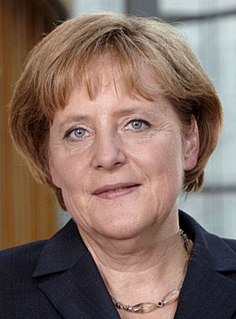
Federal elections took place on 27 September 2009 to elect the members of the 17th Bundestag (parliament) of Germany. Preliminary results showed that the Christian Democratic Union (CDU), its Bavarian sister party, the Christian Social Union (CSU), and the Free Democratic Party (FDP) won the election, and the three parties announced their intention to form a new centre-right government with Angela Merkel as Chancellor. Their main opponent, Frank-Walter Steinmeier's Social Democratic Party (SPD), conceded defeat. The Christian Democrats previously governed in coalition with the FDP in most of the 1949–1966 governments of Konrad Adenauer and Ludwig Erhard and the 1982–1998 governments of Helmut Kohl.

David James "Mac" McAllister is a German politician and Member of the European Parliament (MEP) from Germany. He is a member of the Christian Democratic Union, part of the European People's Party. He is the current Vice President of the European People's Party and he is also Vice Chairman of the International Democrat Union. He was appointed Chair of the European Parliament Foreign Affairs Committee in February 2017.

Federal elections were held on 22 September to elect the members of the 18th Bundestag of Germany. At stake were all 598 seats to the Bundestag, plus 33 overhang seats determined thereafter. The Christian Democratic Union/Christian Social Union (CDU/CSU) of Chancellor Angela Merkel won their best result since 1990, with nearly 42% of the vote and nearly 50% of the seats. However, their coalition partner, the Free Democrats (FDP), failed to meet the 5% vote threshold in what was their worst showing ever in a federal election, thus denying them seats in the Bundestag for the first time in their history.
In modern Germany with its parliamentary system of government on federal and on state level, grand coalition describes a governing coalition of the two biggest parties in one parliament. In most cases this means a coalition of the Union and the Social Democrats (SPD).

Gerhard Fritz Kurt Schröder is a German politician, and served as Chancellor of Germany from 1998 to 2005, during which his most important political project was the Agenda 2010. As a member of the Social Democratic Party of Germany (SPD), he led a coalition government of the SPD and the Greens.

An indirect presidential election was held in Germany on 30 June 2010 following the resignation of Horst Köhler as President of Germany on 31 May 2010. Christian Wulff, the candidate nominated by the three governing parties, the Christian Democratic Union, the Christian Social Union of Bavaria and the Free Democratic Party, was elected President in the third ballot. His main contender was the candidate of two opposition parties, the Social Democratic Party and the Alliance '90/The Greens, independent anti-communist human rights activist Joachim Gauck.

Reiner Haseloff is a German politician who serves as the Minister President of the federal state of Saxony-Anhalt. A scientist like Chancellor Angela Merkel, he was widely considered as one of her closest party allies, but distanced himself from her during the European migrant crisis.
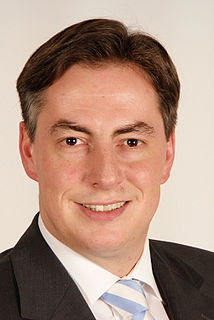
A state election was held in Lower Saxony on 20 January 2013 to elect the 137 members of the Landtag.
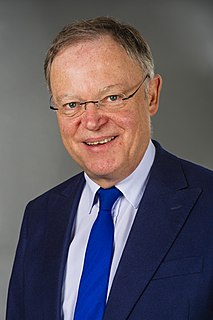
Stephan Weil is a German politician and the leader of the Social Democratic Party in Lower Saxony. On 20 January 2013, the SPD and the Green party won the 2013 Lower Saxony state election by one seat. On 19 February 2013, he was elected Prime Minister of Lower Saxony with the votes of SPD and Alliance '90/The Greens. From 1 November 2013 until 31 October 2014 he was President of the Bundesrat and ex officio deputy to the President of Germany. In November 2017, he was again elected Prime Minister of Lower Saxony with the votes of SPD and CDU.

State elections were held in Saarland on 26 March 2017. All 51 seats in the Landtag of Saarland were up for election. The incumbent Minister-President Annegret Kramp-Karrenbauer went into the election leading a grand coalition of her Christian Democratic Union (CDU) and the Social Democratic Party (SPD), seeking re-election after serving two terms as Minister-President.











